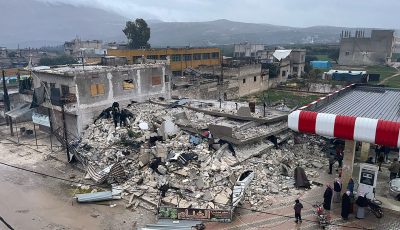FBI shares do’s and don’t’s in active shooter scenario

Federal Bureau of Investigation Special Agent Jay Wolfe speaks before the Rotary Club of Saipan weekly meeting at the Hyatt Regency Saipan yesterday. To his right standing is fellow Special Agent Haejun Park while the rest of the Rotary Club officers listen to the discussion. (Erwin Encinares)
A Federal Bureau of Investigation program that instructs public schools and offices on what to do in the event of an active shooter situation was discussed by FBI agents Haejun Park and Jay Wolfe yesterday at the weekly meeting of the Rotary Club of Saipan at the Hyatt Regency Saipan.
Park, along with colleague Wolfe, shared that active shootings and stabbings occur more often than thought. Park said it can happen anywhere, as it has once already happened here on Saipan. “[The shooter] started out at the Kannat Tabla Shooting Range, ended up in Marpi with the actual gunman taking his life. We don’t mention his name. We don’t want to memorialize him,” stated Park.
Another mass shooting incident was the 1999 Columbine High School shooting. It was this shooting that started the Advance Law Enforcement Rapid Response Training or ALERRT.
“In response to the Columbine shooting, the U.S. came up with a program, ALERRT, or the Advance Law Enforcement Rapid Response Training,” said Park. “The FBI, in partnership with the University of Texas of San Marcos, came up with a training program so we could go around the country, worldwide as well, to teach law enforcement officers how to respond to active shooters.”
Park also told Rotarians of what an active shooter is by using the past incident on Saipan. “Here on Saipan back in 2009, that was an active shooter in its truest definition. The gunman has access to weapons, randomly killing people, indiscriminately spraying into a crowd. That’s the definition of an active shooter. Somebody who wants to create as much havoc, to take out the largest number of people as he can,” said Park.
“In this program, we want to promote worldwide, not only in the U.S., Saipan, and Guam, but we want to promote it in Europe, in Asia, everywhere across the world, so that law enforcement knows how to respond to this,” said Park. “The reasoning behind the ALERRT program is for responders to have a universal system to recognizing allies from foe. Because in the past, there have been crazy responses. So many different law enforcers show up, and we don’t know who’s friendly who’s not. So we have a coordinated training program to help combat that situation.”
Schools on Saipan are also front and center of the program. “We give them [schools] guidance with how to respond to an active shooter. Somebody who’s trying to create as much havoc inside the school program,” said Park.
Rotary Club of Saipan secretary Eli Stoilova asked if hotels would be included in the program for the safety of the tourists.
Park responded with, “We can provide these to hotels, but normally, for now, it is designed for schools and offices and things like that. But yes, we can provide a general training. Every hotel’s layout is different, but normally, if you can’t run, barricade yourselves in. Get into a room, barricade that door. Don’t let anybody in. those are the same principles the local public schools adhere to.”
Park stated that the main goal of the responders to mass shootings are to stop the killings no matter what.
“Our lives at that point are regardless. That’s why we took an oath, that’s why we are sworn to our duty. Our duty at that moment in time, that split second, is to stop the killing. Whether it be addressing the gunman by ourselves, we got to do it quickly and safely. That’s our main goal,” said Park.



























